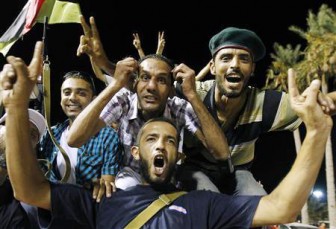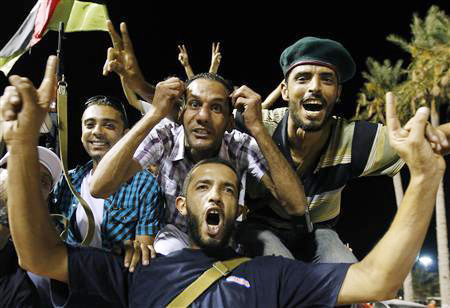TRIPOLI, (Reuters) – Libyan rebels sacked Muammar Gaddafi’s Tripoli bastion, seizing weapons and smashing symbols of a 42-year dictatorship whose demise will transform Libya and send a warning to other Arab autocrats facing popular uprisings.
Gaddafi said his withdrawal from his Bab al-Aziziya headquarters in the heart of the capital was a tactical move after it had been hit by 64 NATO air strikes and he vowed “martyrdom” or victory in his fight against the alliance.
As night fell on Tuesday after a day in which rebels overran Tripoli, meeting little resistance with few casualties, heavy fighting was reported in a southern desert city, Sabha, that rebels forecast would be Gaddafi loyalists’ last redoubt.
Forces loyal to Gaddafi were shelling the towns of Zuara and Ajelat west of

Tripoli, Al-Arabiya television reported.
In Tripoli itself, Reuters correspondents said there still appeared to be some hostile fire around the city centre as darkness descended and looting broke out.
Al-Arabiya quoted a witness as saying that loyalist forces had fired dozens of Grad missiles at the city.
The continued shooting suggested the six-month popular insurgency against Gaddafi, a maverick Arab nationalist who defied the West and kept an iron hand on his oil-exporting, country for four decades, had not completely triumphed yet.
A spokesman for Gaddafi said the Libyan leader was ready to resist the rebels for months, or even years.
“We will turn Libya into a volcano of lava and fire under the feet of the invaders and their treacherous agents,” Moussa Ibrahim said, speaking by telephone to satellite news channels.
Rebel leaders would not enjoy peace if they carried out plans to move to Tripoli from their headquarters in the eastern city of Benghazi, he said.
But Gaddafi was already history in the eyes of the rebels and their political leaders planned high-level talks in Qatar on Wednesday with envoys of the United States, Britain, France, Turkey and the United Arab Emirates on the way ahead.

